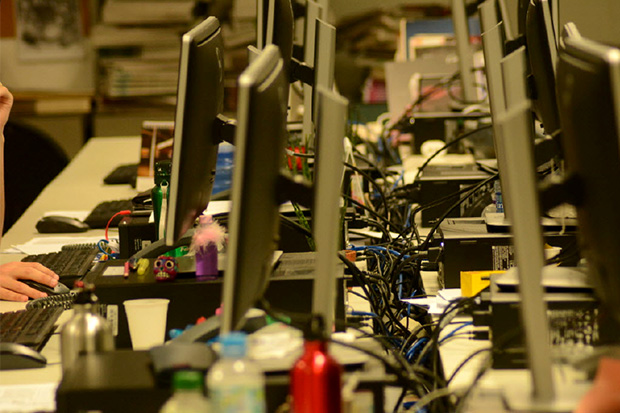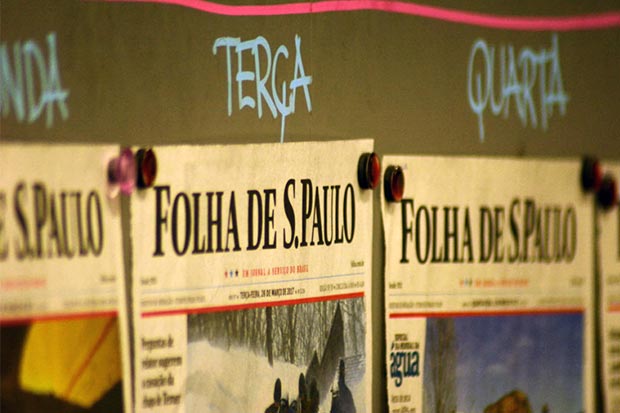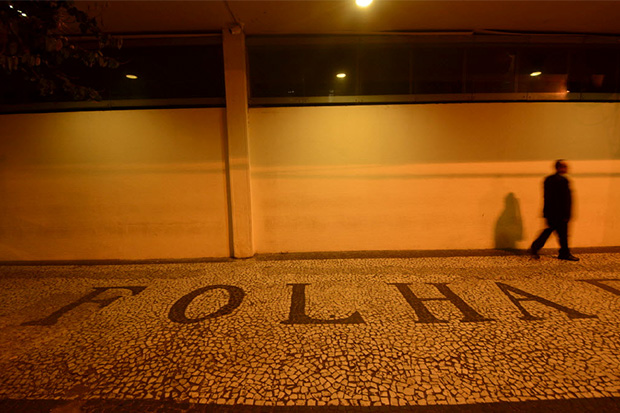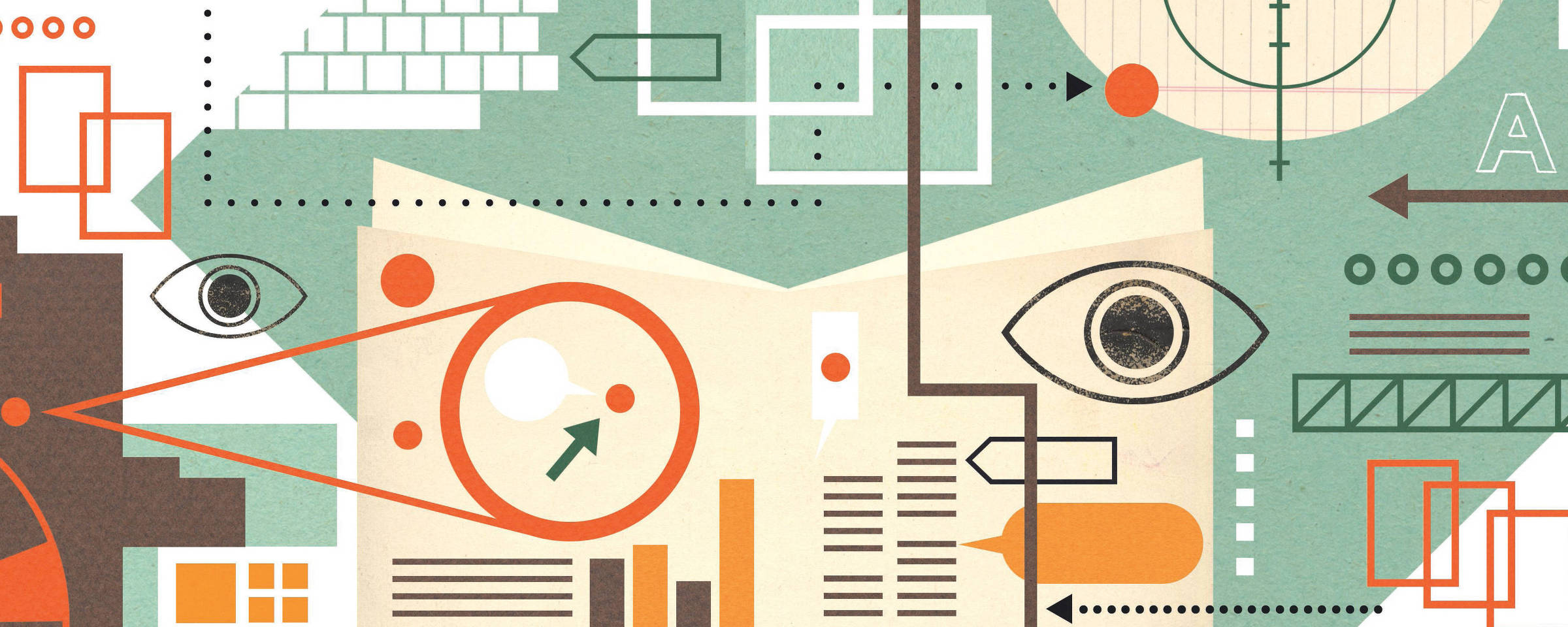Since the spread of the movable-type printing press in the 15th century, a process that gave origin to the massification of reading, never before has so much information been consumed as today.
The escalation of access to the internet in the last 20 years has brought more than 3 billion people online and fomented both the demand for and dissemination of news on an unprecedented scale.
Content producers with a historical track record of quality like Folha are challenged to maintain professional journalistic values in the inherent cacophony within digital media, where entertainment and information, rumor and reality, "fake news" and news get confused and mixed together and almost everything is expressed with the same stridence and reproduced in a disconnected way from the original context.
Professional journalism is characterized by technical rules and standards of conduct that guarantee the faithful reporting of relevant facts. Although this description of objectivity is unreachable as an absolute value, established reading and writing procedures enhance critical detachment and make the descriptions of events as accurate as possible.
By striving to maintain an equilibrium between different forces at play in any given scenario with a willingness to hear and express them, a professional journalist verifies events, points out logical connections among them and establishes a news hierarchy.
The challenge confronting professional journalism has become even greater due to a shaken business model that for decades has supported media companies, based on paid circulation and, above all, on advertising. These are the pillars that have ensured the viability of producing expensive and reliable content, a news organization's main asset.
On one hand, there is a significant audience that is willing to pay for digital subscriptions to news outlets and the growth of an increasingly educated, connected and demanding middle class suggests a promising path to be followed.
On the other hand, a growing share of advertising resources are commanded by the duopoly that controls, on a global scale, the search engines and social networks of the internet. It seems unlikely that the practice of independent professional journalism will become attractive to these conglomerates, which operate much broader commercial operations and have shown themselves to be politically docile when confronted by governments that don't tolerate criticism.
The many types of independent journalism, practiced with the spirit of militancy and dedicated to a particular theme or circumstance for a given community, have proven to be useful in covering gaps in the wider media, but are limited in scope and reach due to the bias in their point of view and the precariousness of their base material - factors that also affect journalism financed by distinct patronage modalities.
It is critical that news organizations find strategies that allow them to sustain their autonomy in the marketplace. To ensure profitability, the equation must include a more efficient support structure better focused on this emergent readership as well as an adjustment in cost structure, which the sector has been forcibly undergoing.
These changes are taking place at a time of intense effervescence in news, with journalistically relevant events happening at an unprecedented velocity one after another; at a moment when, to cite the previous edition of the Folha 's Editorial Project published in 1997, the ideological cards are being shuffled once again.
At the time, when the the hegemony of the United States was becoming increasingly evident after the fall of the Berlin Wall, the world was converging around a market economy, representative democracy and liberal globalization, with a sharp increase in the circulation of goods, people and customs.
Today, China is a rival of the United States, even though their economies are intertwined. Enormous demographic contingents in developing countries have been freed from poverty, but as developed countries emerge from a brutal recession (2008-2012), societies are divided between those who benefit from progress and those who feel excluded, the subject of political rhetoric anchored in conservative and belligerent nationalism. The exacerbation of terrorism serves only to accentuate existing xenophobia in these tendencies. It is too early to predict whether this disturbing inversion of perspectives will be long lasting.
In Brazil, after a period of political and economic stability associated with President Fernando Henrique Cardoso (PSDB Party), the government of Luiz Inácio Lula da Silva (PT Party) reconciled responsible economic management with redistributive programs, benefiting from reforms previously carried out and a favorable international cycle for commodity exports.
The attempt to prolong the bonanza artificially, initially under Lula and taken to the extreme during the administration of Dilma Rousseff (PT Party), culminated in one of the deepest recessions in Brazilian history and ended in a controversial, although constitutional, removal of the president.
After a change in winds, catalyzed by public protests of unprecedented scale, the transitional government led by Michel Temer (PMDB Party) is applying a recipe of liberalizing reforms and discipline on public expenditures.
Successive disappointments have crystalized into vehement popular support for the so-called Operation Car Wash, conducted under the auspices of the Federal Judiciary, in which the Federal Prosecutor's Office and the Federal Police, seconded by the press, continue to uncover a corruption scandal of remarkable proportions.
Starting with Petrobras and compromising above all the PT and PMDB parties, the investigations have revealed a scheme that also involves the PSDB and other parties, in addition to many private companies - especially major construction companies.
In the wake of these events, there is a pervasive, growing feeling that seldom has political polarization been so stark, amplified by the echo chamber that social networks have become, and whose logic leads to Manichaeism. This scenario affects programmatic aspects of this publication - pluralism, critical independence, nonpartisanship - subjecting them to more intense scrutiny and controversy than ever before. However, it also presents a great opportunity for outlets like Folha.
Moments like these call for even more independent vigilance of governments and private companies, reinforcing the classic image of a free press as society's watchdog and a pillar of democracy.
PROPOSITIONAL AGENDA AND CONCLUSIVE TEXT
| Karime Xavier / Folhapress | ||
 |
What defines a newspaper is no longer the printed word nor daily periodicity, but the mission of condensing relevant events for an interested public into information, opinion and analysis.
This posture is what has become known as the curation of multiple events in such a way as to optimize the readers' experience and save them time, which is increasingly scarce and disputed by diverse types of content, news or not.
It is essential, therefore, to know well the demographic makeup, habits and demands of your readership. While it is true that there there has always been a tendency to focus on certain narrow aspects of what has happened, the notion that journalism once covered everything is a myth.
The proposal now is to open up a narrower range of subjects, while at the same time, treating each subject more holistically and in a more interpretative fashion. It takes bravery and technical expertise to select and bet on promising themes for continued coverage.
The journalism practiced by Folha is based on general themes of public interest, translated into useful content in an understandable way for the largest number of people possible. Without failing to present a good informative summary of the latest news cycle - while emphasizing each morning's outlook, subject to updates throughout the day -, the newspaper should seek news that has relevance, reach, originality, a historical or institutional dimension and raises legitimate curiosity and interest.
The maximum priority for journalism continues to be the dissemination of exclusive information: the relevant fact, previously unknown and well researched that a news outlet reveals.
Beyond the intrinsic value of bringing to light information that is unknown to the public, the scoop stimulates the investigative nature of journalism and highlights the influence of the outlet that publishes it.
Ideally, the objective is to capture an unknown fact that is a symbol or symptom of some developing trend or a barely visible social process.
There are other ways to publish exclusive information. Sometimes, a known event merits an original explanation, has an unexpected angle, or can be seen differently.
To identify this dimension, one must set aside consolidated habits and look for new ways to contextualize facts with which the public already has some familiarity.
A significant portion of the news agenda should highlight problems, question authorities, investigate irregularities in the public or private sector and organize coverage of relevant legal proceedings.
However, this should be carried out in a thoughtful and prudent manner, avoiding the incitement of prejudice and the undue exposure of individuals or organizations. It's obligatory to convey the accused's version of events, especially before final judgment and sentencing, and to report on any acquittals that may occur.
The primacy of critical journalism shouldn't exist to the detriment of the publication of content that is inspiring or has a practical use in the lives of readers, who are looking more and more for ways to improve their personal, professional and family lives. As such, part of the reporting agenda should be dedicated to identify news with a positive impact, stimulating aspects or immediate opportunities.
If so-called service journalism today has dispensed with offering the series of routes and listings that have become commonplace on the internet, it still has valuable instruments in its repertoire like testing and discussing the advantages and disadvantages of what will be consumed by the public.
The resulting news content from this selective agenda should go beyond what is merely factual, incorporating an interpretative dimension that, without distorting reality, establishes relationships between current and past events, as well as likely implications.
It should, whenever possible, move in a conclusive direction, identifying problems and pondering the pros and cons of potential solutions.
Even with the adoption of recommended precautions, the press makes mistakes and inaccuracies in reporting; it can, under certain circumstances, unduly harm the public image of individuals or organizations.
It is necessary to reinforce internal mechanisms of checks and balances - mandatory publication of well-founded rebuttals, the role of the Ombudsman/Public Editor (a professional dedicated exclusively to representing the rights and interests of readers, of sources and personalities in the news) and the prompt and regular publication of corrections of verified mistakes.
Folha has, in addition to the characteristics already listed, a solid tradition in statistical journalism, anchored in research conducted by Datafolha, as well as visual journalism, expressed in quality infographics and creative video-journalism. It is imperative to expand and continue adapting these valuable tools for presenting the news. The bases for data are continuously multiplying, constituting an ample field to be mined.
Regarding visual images (photos, videos, infographics), they should be informative and impactful, rigorously selected and prominently published - after all, they increasingly serve as an entry point of access to Folha.
TAKING THE NEWS TO THE READER
| Karime Xavier / Folhapress | ||
 |
Folha 's circulation encompasses readers of the print and digital editions, on diverse platforms. The print edition, which brings together what is most relevant or exclusive that the newspaper has reported over the last 24 hours, continues to account for the largest share of advertising revenue. Online audience, on the other hand, is measured in the tens of millions of visitors per month, given the possibility of free individual access to a limited number of journalistic texts.
The typical consumer is searching for information, but a growing portion of potential readers are waiting for information to reach them. Folha needs to continue adapting to technological innovations and the needs of readers, taking its content to wherever they are. Just as the industrial area is key to delivering the print edition, information technology has become critical for the agility and distribution of the online edition.
In the digital sphere, the journalist's task isn't limited to producing content; journalists also participate in the publication and the distribution of the material produced and share responsibility for reaching and retaining an audience.
An outlet like Folha, however, shouldn't seek to improve its ratings by resorting to vulgarization and sensationalism. It is important to be read and followed, but it is imperative to preserve quality standards and to emphasize the unity of purpose and style in the different versions circulated by the newspaper.
Distribution does not mean free access. Providing journalism that cultivates a commitment to good technical achievement is a costly operation.
Folha believes that the guarantee of quality journalism is in the adequate compensation for the work invested, that copyrights need to be protected and that piracy must be fought.
Folha believes that diversified advertising free of restrictions is essential for maintaining journalistic independence. The commercialization of sponsored content paid for either by advertisers of partners is deemed legitimate, as long as its nature as an advertised, commercialized product is transparent for the reader and the Editorial staff isn't involved in its creation.
Partnerships that help to ensure the production of quality editorial content are also valid and welcome as long as journalistic independence is guaranteed.
THE TOWN SQUARE AND THE GATED COMMUNITY
| Karime Xavier / Folhapress | ||
 |
Folha 's journalism is developed in a critical, nonpartisan and pluralistic tone. Its uniqueness in the Brazilian press is reflected in how it questions and challenges the entrenched powers in the public and private spheres, extending its inquisitive voice in the most varied directions, including to the media itself.
Practicing pluralism doesn't mean ignoring factual investigation, but recognizes that in many cases there is a dimension subject to controversy, which should be considered in terms of dosage, perspective and proportion.
Diversity also manifests itself in the wide ideological spectrum in the body of columnists, that harbor the most representative currents of public opinion and make Folha a natural outlet for conflicting ideas and positions.
The newspaper boasts a dense and varied spectrum of signed opinions and doesn't fail to voice its own regarding the most relevant themes, but the positions it takes don't influence its news coverage.
These characteristics are particularly precious in an environment saturated with crude Manichaeism. Exposing the reading public to these contradictions can serve as an antidote to the recalcitrant irrationalism that reveals itself not only in traditional forms of political intermediation but also in all kinds of ponderation, balance and nuance.
Social media, which could be an environment for coexistence and exchange of ideas, are programmed in such a way that they stimulate the sterile reiteration of pre-existing habits and opinions. The algorithms that guarantee elevated audience ratings for multinational oligopolies are the same that feed sectarianism and the propagation of untruths.
In contrast to this gated community with self-referential beliefs, it's left to outlets like Folha to highlight their role as a public space where varied points of view are arrayed against each other and where the dialogue regarding differences is a permanent one.
Folha believes that this is the way it can provide a service tailored to its reading public. Succeeding in a market that is increasingly demanding and competitive requires a constant re-education that presupposes access to precise information and qualified analysis from diverse angles.
At the same time, the expansion of opportunities to an ever-greater number of people and the survival of democracy itself as a form of civilized co-existence depends on an open public space, vigorous and sustained by the rational debate of different options.
A journalism model like the one sketched out in this document will be a decisive lever in meeting the demands of our time. Imagination and tenacity are needed to keep it viable.
